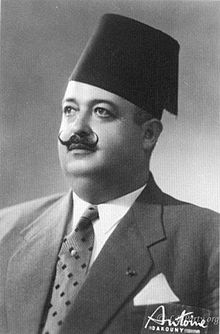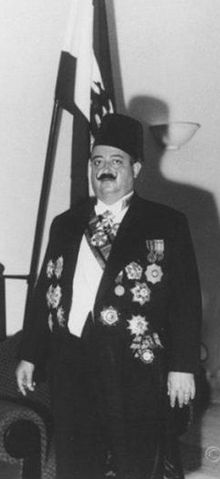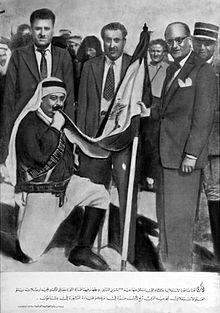- Emir Majid Arslan II
-
Emir Majid Toufic Arslan (in Arabic الأمير مجيد توفيق أرسلان) (born February 1908 in Choueifat, Lebanon — died September 18, 1983 in Khaldeh, south of Beirut) was a Lebanese Druze leader and head of one of the two traditional feudal Druze ruling families, the Arslans against the rival family, the Jumblatts. Emir Majid Arslan was the leader of the Yazbaki (Arslan affiliations) faction. Majid Arslan was a national political figure with a role in Lebanon's independence, a long-running Member of the Lebanese Parliament and a government minister for many times with a number of important ministerial portfolios, most notably Defense, Health, Telecommunications, Agriculture and Justice.
Contents
Personal life
Emir Majid Arslan was the son of Emir Toufic Arslan who helped found Greater Lebanon in 1920. He had three brothers (Nouhad, Riad, Melhem) and a sister (Zahia). Emir Majid studied at the notorious French school, Mission Laique Francaise.
In 1932, he married his cousin, Emira Lamiss Shehab. She bore him two sons: Toufic (1935 — 2003) and Faysal (1941 - 2009).
In 1956, after his first wife’s death, Prince Majid remarried Princess Khawla Jumblatt. She bore him three daughters (Zeina, Rima, and Najwa) and a son, Prince Talal Arslan, current Head of the House of Arslan and leader of the Druzes.
He was known for his exceptional skills in horsemanship and would often exercise his hobby in a southern village El Mageedieh (3 km²), named after him.
Political career
Parliament
Emir Majid Arslan ran for parliamentary elections in 1931 and won the Druze seat of Aley Cazaa district. His allies also won the elections. From 1931 until his death in 1983, he and his allies would win all the parliamentary elections of 1934, 1937, 1943, 1947, 1951, 1953, 1957, 1960, 1964, 1968 and 1972.
Cabinet
Over a period of 35 years, Emir Majid Arslan held various ministerial posts.
- October 1937: Minister of Agriculture
- September 1943: Minister of Health & Defense
- July 1944: Minister of Health & Defense
- May 1946: Minister of Health & Defense
- December 1946: Minister of Telecommunications & Defense
- June 1947: Minister of Telecommunications & Defense
- July 1948: Minister of Agriculture & Defense
- October 1949: Minister of Defense
- February 1954: Minister of Health & Defense
- July 1955: Minister of Defense
- March 1956: Minister of Defense
- November 1956: Minister of Health & Minister of Agriculture
- August 1957: Minister of Telecommunications & Defense
- March 1958: Minister of Agriculture
- August 1960: Minister of Defense
- October 1961: Minister of Defense
- October 1968: Minister of Defense & Justice
- January 1969: Minister of Defense
- November 1969: Minister of Defense
- May 1969: Minister of Defense
- July 1973: Minister of State
- October 1974: Minister of Health
- July 1975: Minister of Health & Agriculture & Housing
Lebanon’s 1943 independence
Emir Majid Arslan was the leader of the independence of Lebanon in 1943 when the president Bechara El Khoury with fellow ministers were taken to prison to Rachaya by the French. 1 7 After World War I, in 1918, the French established control over Lebanon by virtue of a League of Nations Mandate. In 1943, the leaders of the country together with the ministers held a national convention and drew up a National Pact stating that:
- Lebanon is an independent country with an Arab aspect,
- Lebanon is to be led by neither East nor West,
- No to Colonialism,
- Religious sects are to be represented in ministries and all governmental posts,
- The Lebanese government should bring under its control customs, railways and the Regie tobacco monopoly.
- The Lebanese government should supervise and control its borders.
On 10 November 1943, the French retaliated by arresting the Lebanese President Bechara El Khoury, Prime Minister Riad Solh and ministers Camille Chamoun, Adel Osseiran and Abdul Hamid Karami. The French used Senegalese mercenaries to transport these political prisoners to Rashaya Fort in the Beqaa Valley. Ministers Majid Arslan, Sabri Hamadé and Habib Abi Shahla escaped the arrest because they were not in their homes that night.
On 11 November, 1943, Arslan, Hamadeh and Abi Shahla created the “Government of Free Lebanon” with Habib Abi Shahla as Prime Minister and Majid Arslan as Head of National Guard.57 Their headquarters were in Bechamoun, a village 30 km from Beirut. Majid Arslan grouped around him men and artillery in an armed rebellion and was ready to fight the French troops. Meanwhile, disturbances and riots raged all over Lebanon. The Deputies held a secret session during which they drew and signed on a new flag that they handed over to the cabinet of Bshamoun.
On 21 November 1943, Due to riots, open strikes, the armed rebellion of Arslan and the interference of Arab and Western states (mainly Britain), the political prisoners were released. 3 The freed prisoners passed by Bechamoun on their way back home, to thank the rebels. There, they sang the Lebanese National Hymn and Majid Arslan knelt in front of the Lebanese flag and kissed it.
On 22 November 1943, Lebanon was proclaimed an independent state.
Styles of
Emir Majid Arslan II
Reference style His Highness Spoken style Your Highness Alternative style Sire References
- Julia Makarem, http://www.americandruzeheritage.com/
- Pierre Helou, L'Homme du Dialogue Disparait. http://www.rdl.com.lb/
- Aux Origines du "Pacte National", Contribution a l'histoire de la crise Franco-Libanaise de Novembre 1943, by Maxime Rodinson 1988.
- http://www.ingentaconnect.com/
- Lebanon - World War II and Independence. Source: U.S. Library of Congress
- Lebanon's Quest: The Road to Statehood, 1926-1939. Meir Zamir. I.B. Tauris
- http://en.wikipedia.org/wiki/Ministry_of_National_Defense_(Lebanon)
- http://www.syrianhistory.com/People/key/Emir+Majid+Arslan
- http://www.katagogi.com/PhotoAlbum/Default.aspx?l=EN&mid=b24afb8d-e5c8-4ac0-a7a8-af1f652d2a8f&fid=10952&t=vp&aid=a480410_1112226151_104847&PreveVal=12499%7ChuBMwspz9vu9pk0d8UzwhXFrvgv12tdjkjwNt3hz5RM=%7CcR6oXHmRTqlrmr1SLZ1MDw==1
- http://www.allposters.com/-sp/Lebanese-Defense-Minister-Majid-Arslan-Chewing-Cigar-at-Gamal-Abdul-Nasser-s-Party-Posters_i3841723_.htm
- http://www.ldparty.org/new/index.php?option=com_content&view=category&layout=blog&id=40&Itemid=55
- http://www.fanoos.com/society/amir_majid_arslan.html
- http://www.fanoos.com/society/talal_arslan.html
- http://www.people.com/people/archive/article/0,,20085997,00.html
See also
- Prince Talal Arslan
- Princess Zeina Talal Arslan
- Prince Majid Talal Arslan
- Lebanese Independence Day
- www.lebguide.com
- Druze
- Lebanon
Further reading
- Eyal Zisser. Lebanon: The Challenge of Independence. I.B. Tauris. Page 116
- Marc Loris. Lebanon's Fight for Independence (1944).
- Salman Falah. The Druze in the Middle-East. Druze Research & Publications Institute, New York, USA. Pages 28–29)
- Raghid El-Solh. Lebanon and Arabism: National Identity and State Formation. I.B. Tauris.
- Kamal Salibi. A House of Many Mansions: The History of Lebanon Reconsidered.
- Federal Research Division. Lebanon: A Country Study.
Categories:- 1908 births
- 1983 deaths
- Druze people of Lebanese nationality
- Government ministers of Lebanon
- Members of the Parliament of Lebanon
Wikimedia Foundation. 2010.



